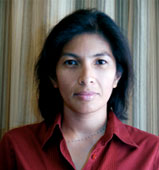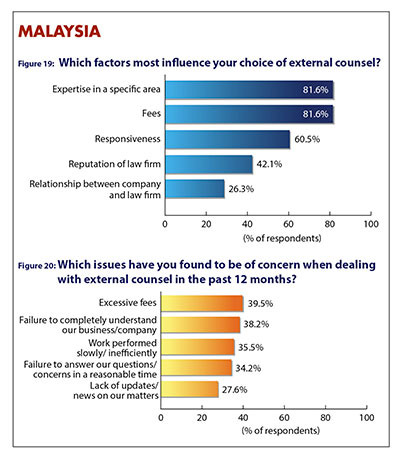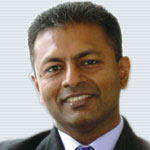
Asian-MENA Counsel: How did your career lead you to your current role in MAS? What is the nature and scope of your role?
Julina Jalaludin: I joined MAS’ legal department in 1996 soon after completing my law studies. As a young Associate Corporate Counsel, I discovered firstly that aviation and airline law, though quite unknown in Malaysia, was (and still is) a highly specialised area with few local legal practitioners. My first few years were dedicated to managing and advising on airline and passenger liabilities in Malaysia and foreign jurisdictions (where MAS operates) and providing in-house legal support to the business in terms of contract review and opinions on commercial contracts and managing the smaller valued litigation matters. I was also made company secretary of one of MAS’ subsidiaries. I was promoted to General Counsel in 2002 and was tasked with managing aircraft and equipment related contracts, IT contracts which included the outsourcing of MAS IT operations and code-share agreements. I was appointed to my current position as Group General Counsel in 2009. My role is to ensure that MAS Group effectively manages and mitigates legal risks and liabilities while supporting the company’s business plans. My scope of work includes providing legal advice to the management team, board of directors and the Government of Malaysia with respect to conventions and foreign laws and regulations which impact MAS, to manage the company’s litigation and dispute resolution matters and to educate and increase the legal awareness of MAS staff.
AMC: How is the value and cost of MAS’ in-house team measured?
JJ: Our value is measured in terms of the value of material contracts, transactions and revenue generating and cost reduction initiatives which the in-house legal team supports the business with. Further, in terms of cost avoidance, we contribute by managing and containing MAS’ exposure to claims in dispute resolution matters. Our individual and departmental performance in terms of adding value, delivering results and cost avoidance initiatives are tracked and results calculated annually via MAS’ Performance Management System (PMS). In 2010, we participated in an industry-wide benchmarking exercise to benchmark the costs of running an in-house legal function against the monetary value in-house brings to the business. We found that our value and costs were very competitive even compared to the other in-house functions.
AMC: What are the biggest obstacles faced in your role, and on a broader level by your in-house team?
JJ: I think that one of the biggest challenges we face as an in-house aviation counsel is the continually evolving legal landscape of the aviation industry and the effort required to keep abreast of the latest developments which impact MAS’ operations, especially as MAS is expanding globally and thus we are required to comply with local laws and regulations. In terms of business ventures, the challenge is to ensure that MAS’ legal risks are mitigated and exposure minimised while enabling the business to obtain the best commercial deal. Striking this balance usually involves tremendous time and effort on our part to communicate our position to the business due to the perception that legal is a stumbling block and creating unnecessary barriers for the business. As Group General Counsel my biggest obstacle at the moment is recruiting and retaining the legal talent within my department. Since we deal in a small and highly specialised area of law it takes between 18 and 24 months to train and develop fully competent counsels to manage aviation and airline law matters.
AMC: What is the current composition of your in-house team?
JJ: Group Legal Practice (GLP) currently has 16 staff consisting of nine lawyers – five General Counsels and four Associate Counsels – three paralegals and four administration staff. We are a centralised legal function for MAS (including our branch stations overseas) and it’s subsidiaries except for MAS Aerospace Engineering, our engineering subsidiary, where we have two lawyers, one as head of warranty & contracts and the other head of corporate ventures. As part of GLP’s Transformation Plan [2010-2012], we are in the process of expanding our organisation to include an additional four lawyers and three paralegals as the demands from the business in terms of legal services has risen over the past five years and also to enable us to deliver our initiatives under the transformation plan.
AMC: What is the nature of the relationship between the company’s in-house function and the business?
JJ: In recent years, the relationship between GLP and the business has improved tremendously due to GLP initiating certain activities which have increased the communication channels between us. These activities include conducting open dialogues, knowledge sharing sessions and training modules, which has resulted in improving the business’s understanding of GLP’s role and vice versa. Currently, we find that most business managers engage the counsels on a regular basis for all kinds of legal matters or queries. The business relies on the counsels and appreciates the value we bring as part of a project team in terms of legal knowledge and ensuring compliance to governance. This is evident from the feedback we receive from the business on a regular basis through the Customer Satisfaction Survey (CSI) form which GLP distributes to all who use GLP’s legal services.
AMC: What qualities does MAS look for in external counsels/ are there any criteria followed in choosing suitable practitioners?
JJ: We would naturally look for external counsels who provide quality legal services and are able to design their advice and solutions to fit the MAS business whilst maintaining strict applications of the law. Those firms who provide additional value in terms of training seminars and newsletters and publications would be preferred. In terms of legal costs, we would look for firms who are more amenable to fixed/capped fees with realistic estimates of legal costs to facilitate our budgeting. We also appreciate firms who are cost conscious and alert us before they incur any additional costs which are beyond their estimates. In terms of criteria, we would prefer firms who provide us with a single partner as the point of contact regardless of the practice areas involved, and are able to empathise with our culture and business sensitivities so that solutions proposed are workable and pragmatic to the business. Usually we tend to continue building on the services of existing law firms which have a continuous good track record with us. Currently we do not have a formalised panel of law firms so we review the performance of external lawyers on a bi-annual basis.
AMC: When hiring for your in-house team, which candidate qualities would be of most value?
JJ: The main qualities which would set apart a potential candidate from the rest would be someone who portrays leadership qualities, is able to see the big picture and has a vision and purpose. The person would also need to be a good team player, creative with the perseverance and drive to deliver results. Most of all I welcome those who love their job – “happiest are those whose hobby is their job”! AMC
|





















